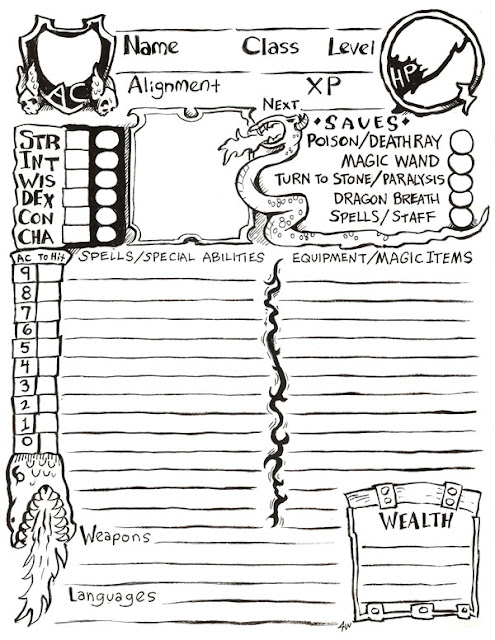Disclaimer: This is not the first time
I've talked about thieves nor is this topic a rarity in the OSR
community. It seems there is something about the good ole thief that
begs for attention.
So the B/X thief sucks. In fact, all
the versions of the thief sucked. Somebody didn't want a first level
thief to be any good at sneaking around and stealing things. Oh sure,
the XP is cheap, but those 15% and 20% skill ranks are not going to
make anyone swoon.

Second edition made a valiant effort to
address this glaring problem by granting players the ability
distribute “discretionary points” between the various skills at
each level. I believe second edition's method is leaps and bounds
better than any other early edition. It made playing a thief far more
interesting as each PC felt personalized. I would actually use the 2e
thief over any of the others any day of the week!
But my flavor is basic. And thus
Labyrinth Lord. So naturally I house rule it.
I'm a bit of a stickler for keeping as
much of the original intact as possible and adding as few new things
as necessary. For the thief, I added more than I normally would. But
the thief is the original skills-based class so why not indulge a
little?
Here are the two rules I apply to
Labyrinth Lord and B/X thieves. The first rule actually applies to
ALL old school thieves, in my games at least.
ONE: The General Rule of Thief
Skills is Skills Bypass Risk
When the thief makes a skill roll they
are attempting to do the task so well that there's no possibility of
failure.
If Dirty Durk the thief rolls a 5
against his crappy 20% Move Silently skill guess what? He makes no
noise. At all. Nothing can POSSIBLY hear him.
But if Dirty Durk fails that roll what
does that tell us? He failed to avoid risk. He wasn't successful at
using his skill. He wasn't SILENT. It doesn't mean he was actually
heard. What you should do then is follow the normal protocol you
would follow for any other class. Maybe make a hear noise check for
monsters or just wing that mother. Whatever works for Nadia the
Scarlet Mage in this case also works for Dirty Durk.
Don't be a dick and say “You failed
your Move Silently roll. The trolls heard you coming down the
corridor like a falling piano.” Unless, maybe, Dirty Durk rolled a
100 or something like that.
TWO: I Give Thieves Bennies
I have a short list of thief
specialties. I will let thieves pick 2 to start with and 1 at every
odd level (3, 5, 7, etc.). It makes each thief different in
significant ways by giving the player meaningful choices. It makes
thieves sexier... as other games figured out (DCC, Lamentations,
etc.).
Here are the thief's specialties. Some
may be selected multiple times (stacking). Also note that I do use
the elegant Advantage/Disadvantage system from 5e. In case you have
been living under a rock, this is just shorthand for rolling twice
and keeping the better or worse roll, depending.
Acrobat:
Dex
check to do stunts or leaps and avoid being slowed down by terrain or
being pinned.
Arcane:
Can
cast Read
Magic
once
per day in order to read and cast spells from arcane scrolls. Must
pass a saving throw vs. Spells to successfully cast. Stacking adds
one more casting of Read
Magic.
Assassin:
Backstab
damage is increased by x1. Stack for additional x1 each.
Blades:
Damage
with daggers and knives is increased to d6. Can stack one time to
gain Advantage on dagger and knife damage.
Fast
Talker: Advantage
on Reaction Rolls.
Forgery:
Copy
any normal document or mimic handwriting with Dex check. Attempt to
copy arcane spell scroll by making a save vs. Spells minus the spell
level per spell to be copied. Takes 1 week per spell per spell level.
Failing a roll with a 1 indicates some nasty mojo and ill luck to
follow.
Goon:
Advantage
on hit point rolls at each new level.
Knife
Thrower: Range
on thrown knife, dagger, or shuriken is doubled. Stack for +1 to hit.
Lucky:
Advantage
on two rolls per day. Stack for additional Advantage roll.
Misdirection:
Sleight-of-hand
tricks with cards, coins, rabbits. Can confuse 1d6 onlookers on
failed save vs. Spells, causing them to lose an action. Can confuse
opponent in combat on failed save vs. Spells, allowing backstab
damage on hit (once).
Skill
Focus: Advantage
on one thief skill. Stack for more skills.
Slippery:
AC
is improved by 2 for one round if employing defense only. Stacking
improves by 1.
Spider
Climber: Can
climb across horizontal surfaces such as ceilings same as any other
wall. Also, Advantage on climbing rolls.
Thug:
Knock
out target on blunt weapon backstab. Save vs. Paralysis negates.
Knockout time = margin of the failed save times thief level.
Ventriloquism:
Throw
voice up to level x 10'.






































